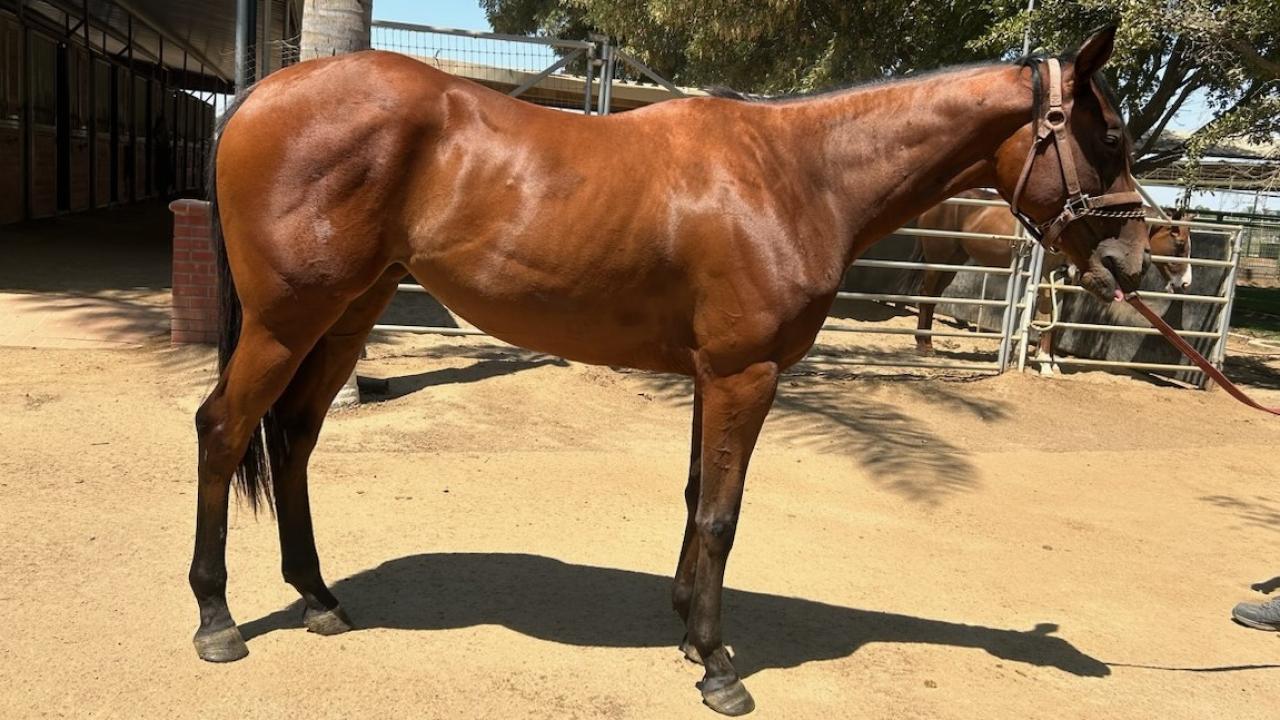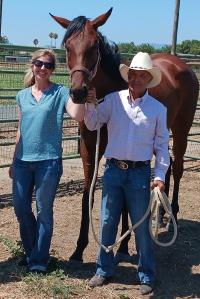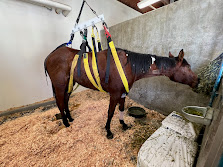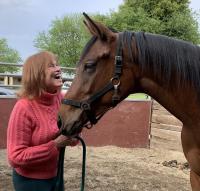
Equine Medicine Specialists Help Thoroughbred Filly Beat the Odds to Survive Tetanus
“Case of the Month” – July 2024

Tenacious Candy, a 2-year-old Thoroughbred filly, endured an extended hospitalization to survive tetanus and injury and is now on her way to a racing career. Days after a leg cut exposed her to the bacterium that causes tetanus, she went down in an exerciser. It took three men and a tractor to get her up. Initially, she could eat and drink, but over a period of hours, she stiffened.
Nearly unable to stand, Tenacious Candy was taken to the Large Animal Clinic at the UC Davis veterinary hospital where specialists in the Equine Internal Medicine Service observed a horse with a prolapsed third eyelid, a rigid mouth, and a stiff body and tail – classic signs of tetanus.
Tetanus is a potentially fatal disease characterized by muscular spasms caused by a neurotoxin produced by the bacterium Clostridium tetani. The organisms are abundant in the soil and surrounding environments, where they can survive for years. Once the spores enter open wounds, they release toxins that quickly affect the host and produce clinical signs by preventing muscles from relaxing normally. Horses are especially sensitive to the bacterium – the prognosis for non-vaccinated horses is often poor if the disease progresses and the animal becomes unable to stand or breathe. Standing horses have a better, but still only a fair prognosis, however, recovery is possible with adequate treatment and supportive care.
Tenacious Candy was given tetanus anti-toxin medication and supportive care of fluid therapy, muscle relaxants, and a quiet environment of low light, low noise, and low activity, as tetanic horses are overly sensitive to stimuli. She did well during her week of hospitalization, with improvement in her ability to eat and reduction in stiffness and was transferred to the veterinary school’s Center for Equine Health for rehabilitation.

“It is not a recovery that can happen overnight,” said Dr. Emily Berryhill, assistant professor of equine medicine. “Horses recovering from tetanus routinely go through an extensive rehabilitation process. The toxins can be out of their system after being bound with antitoxin, but the damaged neuromuscular junctions need several weeks to regenerate.”
Unfortunately, Tenacious Candy sustained significant muscle weakness as part of the disease process and tore a muscle in her hind leg while attempting to stand during rehabilitation. She was taken back to the hospital and placed in a sling to stabilize her and prevent further injury. After nearly a month, she was discharged after being able to lay down and get up repeatedly on her own.
“Caring for Tenacious Candy was a labor of love for the veterinarians, students, and staff at the hospital,” Dr. Berryhill stated. “It is not easy for a young, high-energy horse to stay in a stall for that length of time, let alone tolerate a sling. We all grew to love her personality and spark, which helped her survive the worst. She truly lived up her name.”

Tetanus is preventable with vaccination. It is recommended that horses have a primary vaccination series of two doses at a 4- to 6-week interval as a foal, followed by repeat vaccinations at 1 year of age and then annually thereafter. Even though Candy was vaccinated on schedule, it is possible that she did not generate the full immunity needed as a foal, increasing her risk of developing tetanus. However, her previous vaccinations did provide partial immunity, which helped her survive, even though they were not enough to fully protect her from the disease.
“In addition to vaccination, proper first aid and wound care can help prevent tetanus,” said Dr. Berryhill. “We recommend keeping stalls, paddocks, and other barn areas free of materials that could cause injury and seeking veterinary intervention for wounds, even if small.”
“Candy’s survival was touch and go that first week,” said owner Mary Ellen Conway. “She is alive today because of the unflagging, over-the-top care given by Dr. Berryhill and the entire UC Davis team. I am beyond grateful they pulled her though.”
Tenacious Candy’s damsire is California Stakes winner and Kentucky sire Twirling Candy (11 starts – 7 wins; $900K+ in earnings). Her sire, Clubhouse Ride (43 starts – 5 wins; $1.3M+ in earnings), was also a leading California runner. Conway bred to Clubhouse Ride due to his durability and because she witnessed the racing prowess of his sire, Argentinian champion and leading Kentucky sire Candy Ride (6 undefeated starts, including the Pacific Classic at Del Mar; $700K+ in earnings).
# # #
